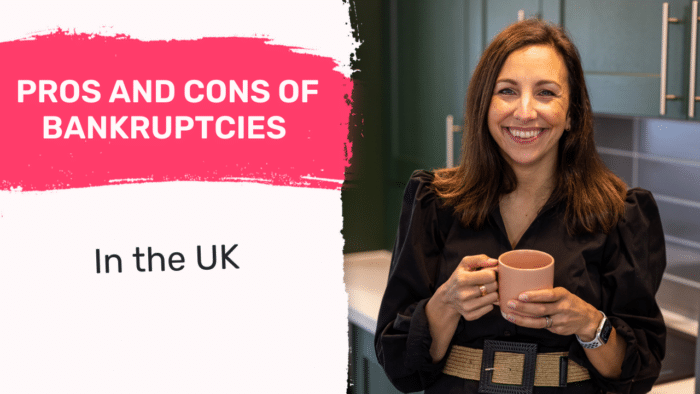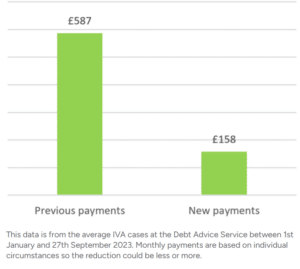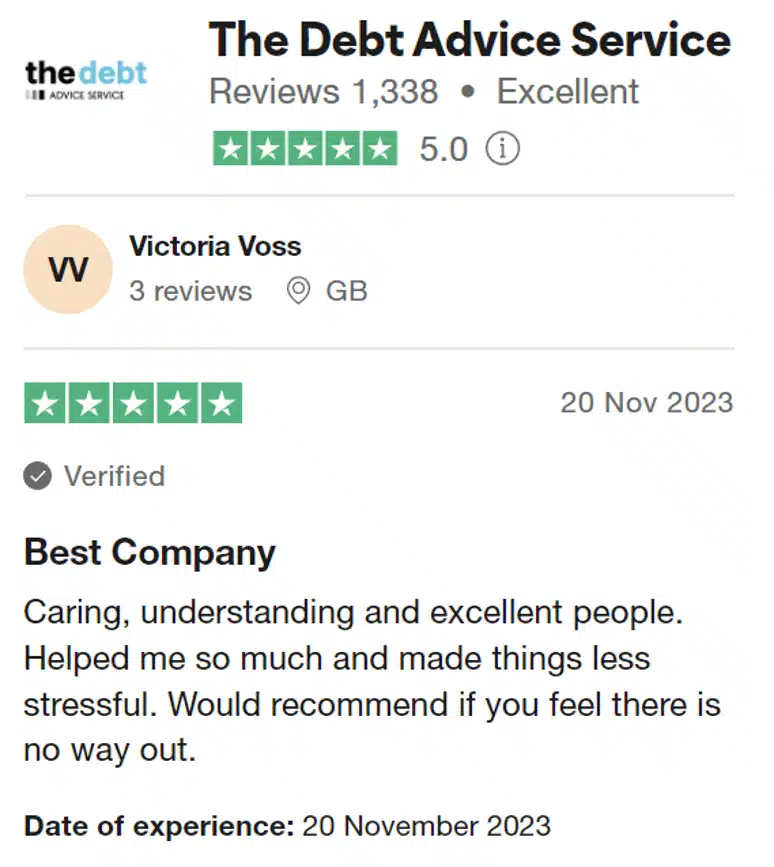5 Pros and 5 Cons of Bankruptcies in the UK
For free & impartial money advice you can visit MoneyHelper. We work with The Debt Advice Service who provide information about your options. This isn’t a full fact-find, some debt solutions may not be suitable in all circumstances, ongoing fees might apply & your credit rating may be affected.

For free & impartial money advice you can visit MoneyHelper. We work with The Debt Advice Service who provide information about your options. This isn’t a full fact-find, some debt solutions may not be suitable in all circumstances, ongoing fees might apply & your credit rating may be affected.
If you’re worried about paying a debt and thinking about bankruptcy in the UK, you’re in the right place. This article aims to help you understand the ups and downs of bankruptcy.
Our website gets over 12,000 visitors each month looking for guidance on debt topics, so you’re not alone.
In this article, we’ll look at:
- What bankruptcy is and how it works.
- The types of debt that can and can’t be included in bankruptcy.
- The role of the Official Receiver in bankruptcy.
- What happens during and after bankruptcy.
- The good and bad sides of bankruptcy.
We know that dealing with debt can be scary; some of us have been in your shoes. We’re here to give you the facts, answer your questions, and help you figure out your next steps.
So, let’s get started on understanding the pros and cons of bankruptcy in the UK.
Voluntary Vs involuntary bankruptcy
Most people declare themselves bankrupt, which is known as voluntary bankruptcy. But in some cases, you can be forced into bankruptcy, which is known as – you guessed it – an involuntary bankruptcy.
Involuntary bankruptcy is when a creditor petition for you to be made bankrupt because you owe them £5,000 or more.
The other way you could be forced into bankruptcy is if you fail to keep to the terms of an Individual Voluntary Arrangement (IVA), which is a different type of debt solution.
» TAKE ACTION NOW: Fill out the short debt form
Who can apply to be voluntarily bankrupt?
Anybody can apply to make themselves bankrupt if they believe they cannot afford to repay their debts in a reasonable amount of time and if no other debt solution is a better option.
The only real way to know this is to get debt advice, which I’ll return to later in this post.
Interestingly, there isn’t a minimum amount of debt you need to have to declare voluntary bankruptcy, but there might be a softer type of insolvency for debtors with no assets and less than £30,000 of unsecured debt. I’ll also be returning to this alternative later.
How a debt solution could help
Some debt solutions can:
- Stop nasty calls from creditors
- Freeze interest and charges
- Reduce your monthly
A few debt solutions can even result in writing off some of your debt.
Here’s an example:
Situation
| Monthly income | £2,504 |
| Monthly expenses | £2,345 |
| Total debt | £32,049 |
Monthly debt repayments
| Before | £587 |
| After | £158 |
£429 reduction in monthly payments

If you want to learn what debt solutions are available to you, click the button below to get started.
What debt can be included in voluntary bankruptcy?
Most unsecured and secured debts can be included within a bankruptcy, giving you a completely fresh start once the whole process is over. This includes personal loans, credit cards, utility arrears, mortgage arrears, rent arrears and much more.
But there are a couple of exceptions you must be aware of…
What debt cannot be included in voluntary bankruptcy?
Some debts cannot be covered by bankruptcy and you need to know which ones before applying. You won’t be able to include the following debts and arrears in your bankruptcy:
- Magistrate court fines
- Debts owed to the Student Loans Company
- Debts accumulated due to fraud
- Child maintenance arrears
- Money owed to another party as compensation due to injury
Thousands have already tackled their debt
Every day our partners, The Debt Advice Service, help people find out whether they can lower their repayments and finally tackle or write off some of their debt.

Natasha
I’d recommend this firm to anyone struggling with debt – my mind has been put to rest, all is getting sorted.
Reviews shown are for The Debt Advice Service.
What happens when you’re bankruptcy is approved?
If your bankruptcy application is approved, you’ll be placed under the restrictions of a bankruptcy order, which is put in place for a fixed length of time.
All your creditors and debt collectors, those as Global Debt Recovery and Lowell, won’t be able to contact you about the debts anymore.
You will have to live under strict financial restrictions as decided by the official receiver. And if you’re receiving an income, you’ll likely be asked to make payments to creditors as part of a payment plan called an Income Payment Agreement.
What happens after your bankruptcy is discharged?
Most people are discharged from their bankruptcy after 12 months, although some people’s bankruptcy discharge gets delayed, typically if the debtor doesn’t keep to the restrictions placed on them.
However, it’s important to know that everything isn’t immediately dandy once you’re discharged. For example:
- You might still be under restrictions in the bankruptcy order
- Your home could still be sold up to three years after being discharged
- You might still have to pay towards some debts for three further years as part of the Income Payment Agreement
Only once the bankruptcy order has ended and three further years have passed will you not be liable to repay the debt or give up assets for sale.
What are the pros and cons of bankruptcies?
If you’re curious about the pros and cons of bankruptcy, you’re not alone. Many people have the same question.

Source: https://forums.moneysavingexpert.com/discussion/481639/pros-and-cons-of-bankruptcy
When considering using bankruptcy to end your debt hell, you need to know all of the pros and cons and how these could affect you over the long term.
Improve your understanding with the lists below, and make sure you speak to a debt adviser when you don’t 100% understand.
The pros of bankruptcy
- The eligibility requirements to apply are minimal and you don’t even need to exceed a certain amount of debt. But it should only be used when most suitable.
- The application fee can be paid in instalments
- Creditors cannot take further action or even contact you
- If the bankruptcy is successful, the debts will be written off to give you a clean slate
- Free bankruptcy debt advice is available, which is essential before proceeding
The cons of bankruptcy
- There’s an application fee
- You will live under strict restrictions regarding finances
- Assets might be sold and you may need to pay creditors as part of an Income Payment Agreement. These are still possibilities up to three years after being discharged from bankruptcy. So, it’s not a quick debt fix!
- Your bankruptcy is publicly recorded and affects your credit rating
- Bankruptcy can affect some types of employment, mainly positions in finance.
Pros and cons of bankruptcies – Scotland!
Bankruptcy in Scotland is called Sequestration.
Although parts of the process are different to voluntary bankruptcy in England and Wales, many of the pros and cons of bankruptcy in Scotland are identical.
You can access a comprehensive list of these pros and cons by visiting this Citizens Advice Scotland page.
Can you have a joint bankruptcy?
You can’t have a joint bankruptcy for personal debts. You can only have a joint bankruptcy for business debts when the other person is your business partner.
That being said, you can include a joint debt in your individual bankruptcy application. However, doing this has consequences for the other person who owns the debt but isn’t declaring bankruptcy.
It’s best to discuss this together, preferably with the support of a debt charity adviser.
Can you take out a loan while bankrupt?
Surprisingly, you’re legally allowed to take out a loan of up to £499 without being obligated to disclose that you’re bankrupt. But your Official Receiver might have added restrictions that prevent this.
In most cases, bankruptcy only requires you to declare your bankruptcy to the lender when trying to gain £500 credit or more. But in this case, the lender is likely to refuse you out of fear they won’t get repaid.
If you need more money during bankruptcy, it’s best to discuss this with your Official Receiver instead.
Can you get a mortgage after bankruptcy?
Bankruptcy stays on your credit file for six years and significantly reduces your credit score. You will find it more difficult to get approved for more credit, including a mortgage.
But it’s not impossible to get a mortgage after bankruptcy, especially if you have a stable income and haven’t accumulated other debts since.
There are even some mortgage lenders who advertise mortgages specifically for people with a poor credit history, including people who have used bankruptcy in the past.
How much does bankruptcy cost?
Right now, bankruptcy costs £680 but this can change over time. It used to cost less.
Sometimes there is financial aid available to low earners who want to use bankruptcy, which is best investigated online or with the help of Citizens Advice.
If you can’t get financial support to pay the application fee, you can pay in instalments. But note, the application isn’t actually submitted and considered until all £680 has been paid.
Alternative debt solutions to bankruptcy
There is a whole range of different debt solutions that could be a more suitable option than bankruptcy. One of those alternatives is a Debt Relief Order (DRO), sometimes referred to as a softer bankruptcy for unsecured debts only.
The only trouble is a DRO has stricter eligibility requirements. Your debt must fall below £30,000 at the time of application acceptance – not just the time of application – and you must have no valuable assets. Even your disposable income cannot exceed a certain monthly threshold.
But if you do qualify, all of your debts could be written off with no need for any repayments after just one year. The DRO blocks creditors from adding interest or making contact. And if your finances haven’t improved after the year is up, all debt is 100% wiped.
